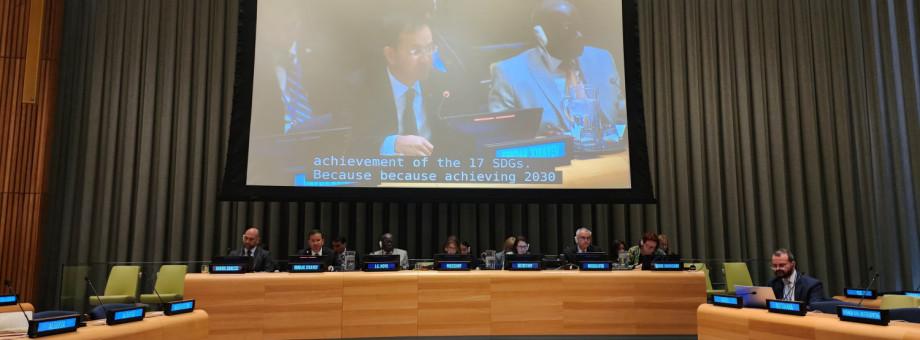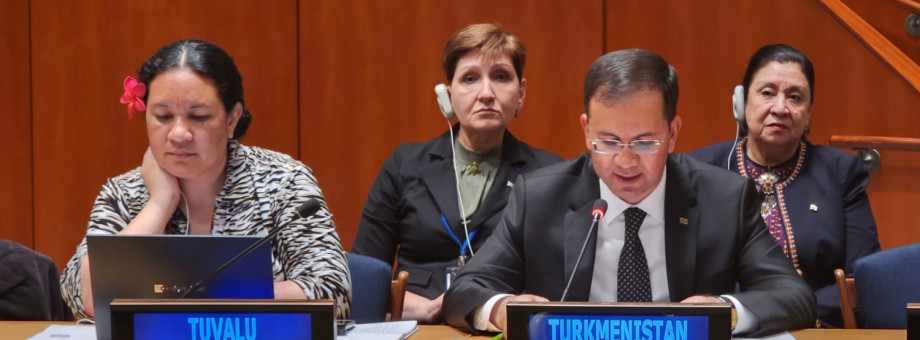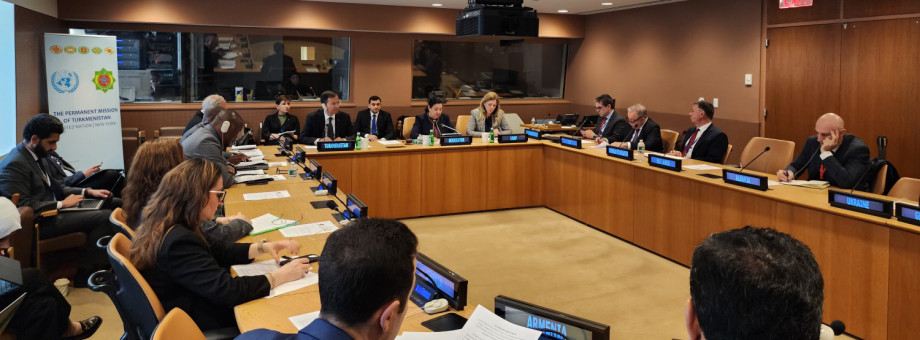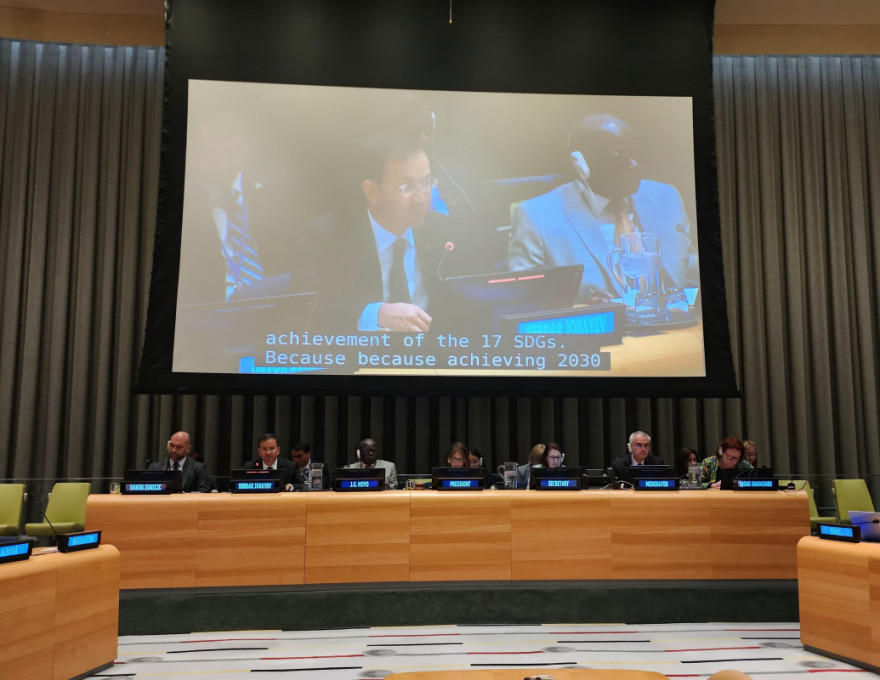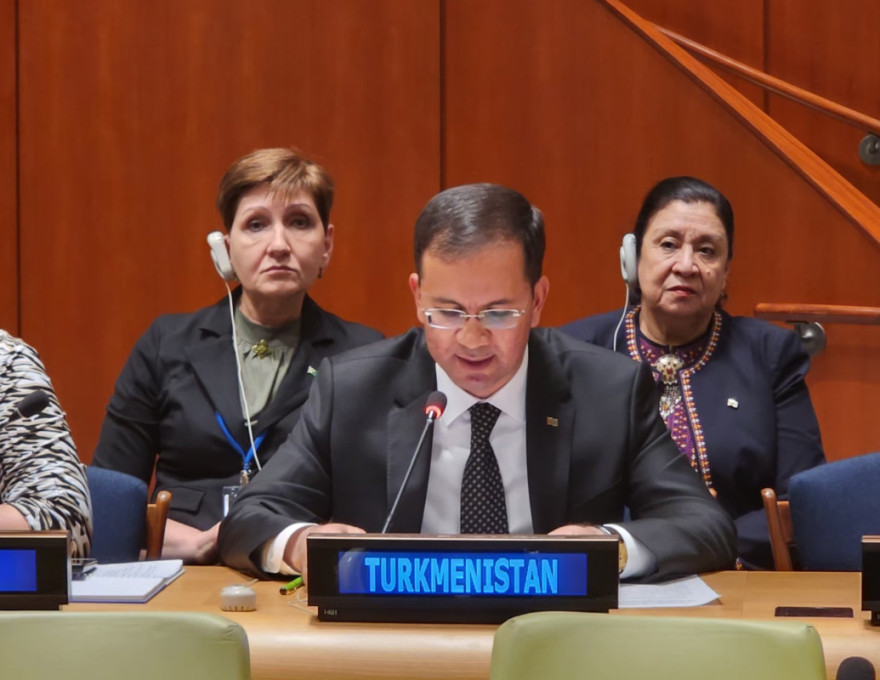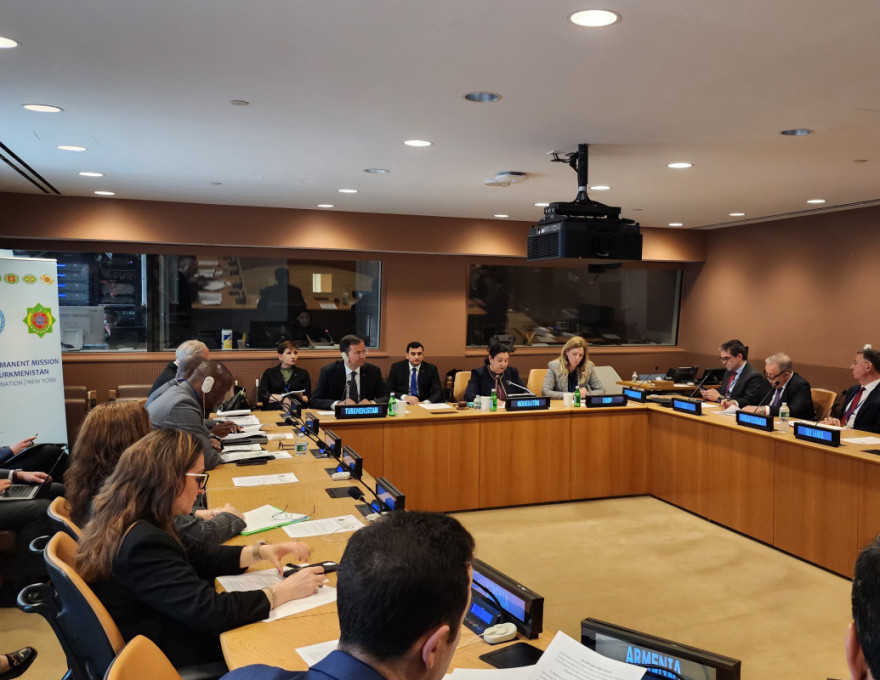Turkmenistan voiced its approaches to financing for development at the ECOSOC Forum
On April 22-24, the delegation of Turkmenistan headed by the Minister of Finance and Economy Mr. Serdar Jorayev took part in the UN Economic and Social Council (ECOSOC) Forum on Financing for Development Follow-up (FfD Forum).
UN Secretary-General António Guterres, addressing the Forum, noted that financing is the foundation of development, but many developing countries are not able to provide the necessary investments in sustainable economic development, as well as in the development of national social service systems. He stressed that the numerous appeals for assistance from the least developed and developing countries to the global financial institutions had not been adequately supported and that global stabilizing mechanisms had not been adequately supported.
The Secretary-General called on states to increase investment flows in order to fill the financing gap and provide opportunities for vulnerable countries to maintain an adequate standard of living for the population.
In this regard, Antonio Guterres proposed a four-pronged solution to overcome the global development financing gap:
- Increasing the contribution of developed countries, especially the G20 countries;
- Optimization of development banks' resources through cooperation with central banks and rating agencies;
- Tackling the debt burden through new financing that will focus on sustainable development and debt restructuring;
- Increasing the level of participation of developing countries in decision-making within international financial institutions.
In his remarks, the UN Under-Secretary-General for Economic and Social Affairs (UNDESA), Mr. Li Junhua, noting that the world is facing a financing crisis for the implementation of the 2030 Agenda, drew attention to the widening gap between the funds needed and the resources currently available. Despite the progress made since 2002, the risks of an increase in national debt levels are growing, making it even more difficult to achieve the Sustainable Development Goals.
According to him, the upcoming Conference on Financing for Development in 2025 is seen as a key opportunity to address the existing challenges. At the same time, the Financing for Sustainable Development Report 2024 invites Member States to consider four key issues: options for reducing the financing gap, reform of the international financial architecture, and finding new ways to restore confidence in multilateral mechanisms.
On April 23, the Minister of Finance and Economy of Turkmenistan spoke at the plenary session of the Forum. The country's active practical activities in the implementation of the Addis Ababa Action Agenda on Financing for Development and the initiatives promoted by Turkmenistan to create mechanisms for mobilizing resources for global development, based, among other things, on public-private partnerships and long-term financing of the private sector, were emphasized.
Noting the key role of financing for sustainable development in achieving the SDGs at all levels, the Minister noted that despite the progress made, global economic processes and geopolitical risks negatively affect the mobilization of sufficient funds for the implementation of global programs and strategies in the field of sustainable development.
Participants were briefed on national experiences in the implementation of the Integrated Development Financing Mechanism, which was also outlined in the second Voluntary National Review on the implementation of the SDGs in 2023.
The role of national strategies for the implementation of the SDGs, including transparent and effective public finance management systems, the use of innovative financial instruments and digital technologies, was noted.
The need to build updated, more effective and flexible mechanisms for financing development at the global and regional levels was emphasized.
On April 23, 2024, the head of the delegation of Turkmenistan also took part as one of the keynote speakers of the Forum's panel discussion entitled "Mobilization of domestic public resources".
During this discussion, the Minister drew attention to the importance of ensuring the proper level of mobilization of domestic public resources, improving economic and financial policies, strengthening the fight against financial irregularities and tax evasion through innovative tools, which contributes to achieving inclusive economic development and effective financing of the Sustainable Development Goals.
It was emphasized that Turkmenistan is actively working on the consolidation of domestic resources for development, improving the fiscal system and introducing program budgeting for the implementation of national priorities in accordance with the 2030 Agenda for Sustainable Development.
He noted that in order to successfully achieve global goals and objectives, it is necessary to continue multilateral partnership and cooperation, expand technical and financial support from international organizations and global financial institutions.
On the same day, at the initiative of Turkmenistan, a side event "High-Level Dialogue on Transport and Energy Connectivity to Enhance Financing for Development: UN Decade of Sustainable Transport 2026-2035, Ashgabat Platform for Energy Connectivity" was held.
The dialogue was attended by Ms. Ivana Zivkovic, UN Assistant Secretary-General, Director of the UNDP Regional Bureau for Europe and the CIS, Mr. Sandagdorj Erdenebileg, acting UN Under-Secretary-General, High Representative for the Least Developed Countries, Landlocked Developing Countries and Small Island Developing States, representatives of the UN Department of Economic and Social Affairs, heads of national delegations to the FfD Forum, Permanent Representatives and experts of the UN Member States.
Opening the meeting, Permanent Representative of Turkmenistan to the United Nations, Ambassador Aksoltan Ataeva noted that the organized event is an important step towards building an effective partnership in the field of multilateral financing of transport and energy. The need to move to practical actions and develop innovative strategies to bridge the infrastructure gap between countries, based on broad international cooperation to address issues of transport, logistics and energy connectivity was emphasized. A. Ataeva noted that the results of the Dialogue should become a contribution to the preparatory process for the Third UN Conference on Landlocked Developing Countries (LLDC3).
In his speech, the Minister of Finance and Economy of Turkmenistan Mr. Serdar Jorayev focused on strengthening cooperation at the UN platform aimed at developing stable and reliable energy mobility in the context of growing crisis phenomena in the world energy markets, creating sustainable transport systems and strengthening logistics connectivity as an important factor in ensuring sustainable development.
He noted that the development of transport and energy infrastructure is crucial for sustainable development and Turkmenistan is interested in developing financing mechanisms to ensure sustainable energy connectivity.
The participants of the Dialogue paid special attention to the following issues of the development of multilateral cooperation:
- The need to implement UNGA resolutions 78/148 " Strengthening the links between all modes of transport to achieve the Sustainable Development Goals" and 78/149 "The pivotal role of reliable and stable energy connectivity in driving sustainable development", adopted at the initiative of Turkmenistan in December 2023;
- The importance of adopting and implementing an updated Programme of Action for Landlocked Countries during the upcoming LLDC3 Conference, taking into account the transport, transit and energy segments;
- Use of the results of the high-level meetings of the UN General Assembly on sustainable transport and cooperation in the field of sustainable energy held on April 17 and 18 this year in further cooperation within the framework of the UN;
- Consolidation of multilateral efforts in the development of the Action Plan for the upcoming UN Decade on Sustainable Transport for 2026-2035 and the use in this regard of the international events scheduled for November 2024 devoted to the World Sustainable Transport Day;
- Further development and strengthening of the currently functioning UN multilateral formats in the field of transport and energy, especially the Group of Friends on Sustainable Transport and the Group of Friends of Sustainable Energy;
The delegates expressed their gratitude to the Government of Turkmenistan for its leadership in promoting sustainable transport and energy security at the global level, as well as support in further promoting initiatives in these important areas of the global sustainable development agenda.
As a result of the High-level Dialogue, the participants agreed on the Outcome Document summarizing the results of the discussion.
---------------------
---------------------
SUMMARY DOCUMENT
of the Side Event entitled “High-Level Dialogue on Transport and Energy Connectivity for Increasing Development Financing: the United Nations Decade of Sustainable Transport for 2026 – 2035, Ashgabat Platform for Energy Connectivity”
A High-Level Dialogue on Transport and Energy Connectivity for Increasing Development Financing was held on April 23, 2024, at the United Nations headquarters in New York. The event aimed to discuss the connections between expanding transport and energy infrastructure, and attracting development financing for landlocked developing countries.
Key discussion areas
Aligned with the United Nations General Assembly resolutions 78/148 and 78/149, the dialogue focused on strengthening innovative transport and energy infrastructure to unlock economic potential and attract financing for sustainable development.
Participants assessed progress made on implementing relevant UN documents and decisions, with a focus on improving the lives of people in landlocked developing countries. This assessment identified key areas for diversification and transformation through science and innovation.
The importance of joint efforts within the United Nations Decade of Sustainable Transport for the 10-year period beginning on 1 January 2026 was emphasized. This includes broad consultations with the United Nations Member States, UN entities, and other stakeholders.
Importance of Sustainable Infrastructure
Participants highlighted the importance of sustainable transport systems for regional connectivity, universal access to affordable energy, and economic development.
Investment in infrastructure was discussed, with a focus on public-private partnerships, joint financing mechanisms, and resource concentration from energy, transport, and financial sectors.
The dialogue acknowledged the need for creating favorable conditions for accessing new technologies to develop modern infrastructure.
Recommendations and outcomes
Valuable recommendations from the dialogue contributed to the preparations for the Third United Nations Conference on Landlocked Developing Countries (LLDCs).
Participants aimed to contribute to a more goal-oriented LLDCs agenda by proposing solutions for increased investment in critical infrastructure, developing new tools, and promoting multilateral partnerships.
The focus is on establishing sustainable and interconnected energy and transport systems, and undertaking mutually beneficial investment and innovation projects.
Conclusion
The High-Level Dialogue aligned with current global initiatives, demonstrating commitment to achieving SDGs through collaboration and knowledge exchange. This event served as a significant precursor to the Third United Nations Conference on Landlocked Developing Countries, providing a platform for progress assessment, proposal development, and shaping the development agenda for landlocked countries. By promoting systemic cooperation and innovation, the dialogue aims to pave the way for a more interconnected and prosperous future built on sustainable transport and energy infrastructure.
The participants expressed appreciation to the Government of Turkmenistan for organizing this high-level dialogue.


 NEWS
NEWS
